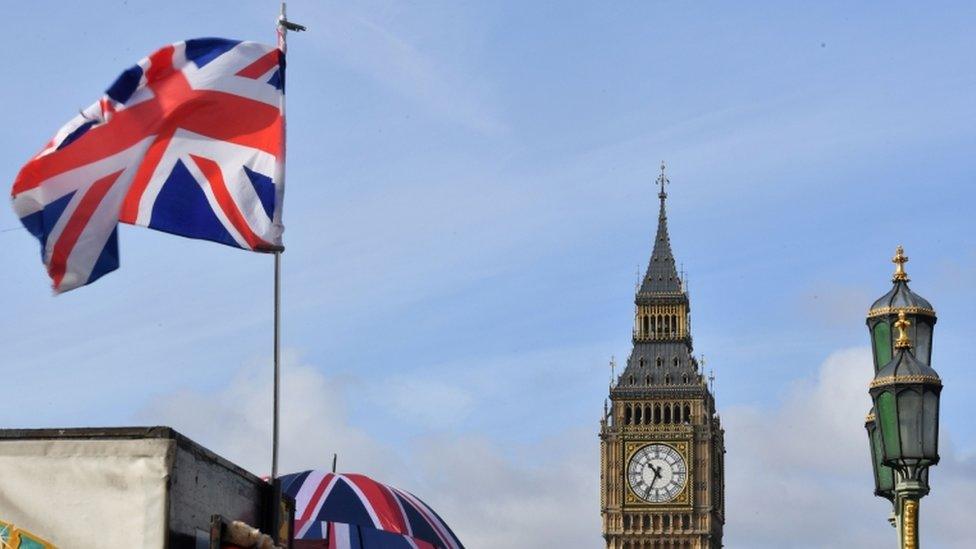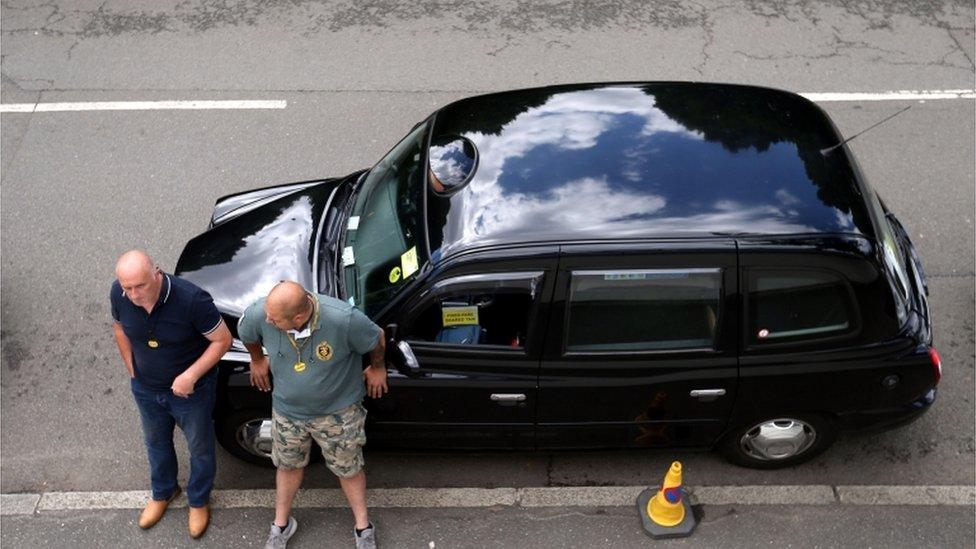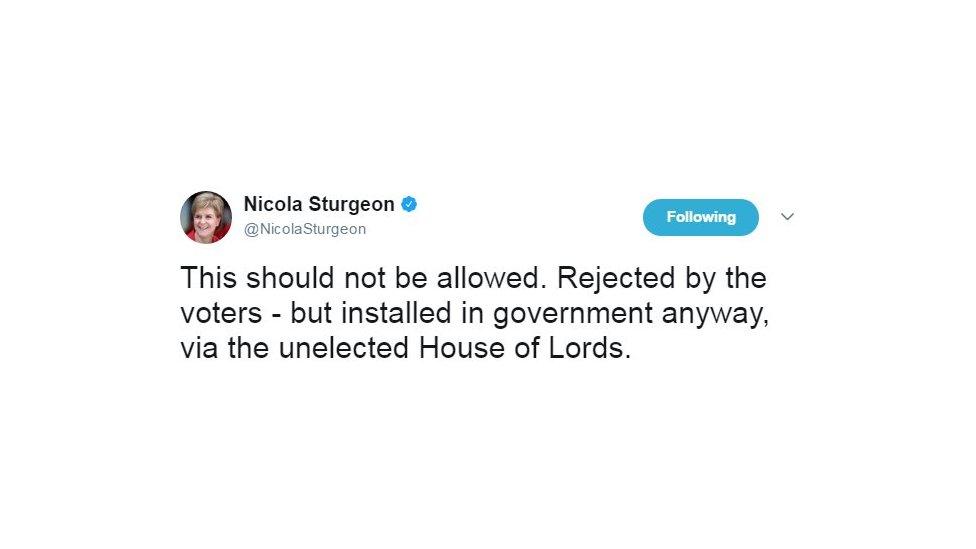Week ahead in Parliament
- Published
- comments

It's the final four days of Parliament before the summer recess, with not all that much to occupy honourable members and noble lords, although Labour have succeeded in engineering an emergency debate to complain about the way the Commons has been managed, since the election.
Wiser heads are advising new members to enjoy the relative quiet while they can, on the expectation that Brexit hostilities will commence when they return in September, and the European Union (Withdrawal) Bill is debated.
They expect long sittings, knife-edge votes, ambushes and guerrilla warfare at every turn.
The change of pace could be pretty startling for newcomers who have only experienced the torpid pace of this short post-election interlude - they will move from gentle ambling to a cross-country yomp under fire.
In the meantime, the lesson of these initial few weeks is that even apparently anodyne general debates, in Westminster Hall as well as in the chamber, can be used to put pressure on the government, as this week's Euratom debate has demonstrated, external.
A government with no majority is always vulnerable and can't ignore its backbenchers, and with the prospect of a new election at any moment, even the most loyal will be tempted to push some constituency cause.
Here's my rundown of the week ahead....
Monday
The Commons day opens (2.30 pm) with Communities and Local Government questions, which will be followed by any urgent questions or ministerial statements. One subject that may be raised is the final confirmation of the HS2 route through South Yorkshire, which is expected from the Department for Transport ahead of the parliamentary recess.
Local press reports suggest that the unpopular so-called "M18" route will be announced in a written ministerial statement. The proposals would then go to consultation.
Then comes the emergency debate on the scheduling of parliamentary business, which Labour's shadow leader of the Commons, Valerie Vaz, applied for, complaining that since the Queen's Speech there had only been seven votes in the Commons, and no Opposition debates.
This could provide an opportunity for a number of MPs to raise other complaints about the way Commons business is being handled - one issue is the number of Commons days allocated to debate private members' bills across what the government intends will be a two-year parliamentary session.
Essentially there will be one year's ration of private members' bills across a two-year period, and there may be an attempt to amend the government's procedural motion setting that out, which could attract support from some rebel Conservatives. Watch this space.
Following on from Wednesday's Westminster Hall debate on abuse directed at candidates during the general election, there will be a full-dress debate in the Commons chamber.
The adjournment debate is on acid attacks - former minister Stephen Timms is worried about the increase in the level of crime involving acid (since 2010 there have been 415 attacks in Newham) and wants to raise the issue after an attack in his constituency.
He wants to highlight the level of alarm in his community and will be pressing the government to introduce restrictions on the purchase and carrying of acid, in line with those that already exist for knives.
In the Lords (2.30 pm) questions to ministers include one from Labour's Baroness Jones of Whitchurch on lifting the ban on fox hunting.
The main debates are on the report from the European Union Committee Brexit: UK-EU movement of people, external and the report from the Economic Affairs Committee The Price of Power: Reforming the Electricity Market, external.
Tuesday
In the Commons (at 11.30am), MPs open with Treasury questions. Look out for the debut of the new select committee chair, Nicky Morgan. That is followed (barring any statements or UQs) by a general debate on drugs policy.
In Westminster Hall, the debates include: Anglo-Polish relations (9.30am-11am) led by the Conservative Daniel Kawczynski; the risk to UK aviation from drones, led by the Conservative Jeremy Lefroy, who warns that the risks posed by drones to aviation are increasing all the time, as the recent closure of runways at Gatwick showed. He is calling for regulation and effective 'electronic fencing' to protect civil and military aircraft.

Wes Streeting, the Labour MP for Ilford North, has a debate on the taxi trade
In the afternoon sitting, the subjects include the future of the taxi trade (2.30pm-4pm) - the Labour MP Wes Streeting, who chairs the all-party group on taxis, will lead a discussion of its new report on the future of the taxi trade, which highlights inconsistent licensing practices between different local councils and calls for new powers for elected mayors to control the number of private hire vehicles, to control pollution and protect public safety.
Then, (4pm-4.30 pm) the subject is "catfishing and social media" - led by Labour's Ann Coffey. Catfishing is when someone creates fake profiles on social media sites to trick people into thinking they are somebody else. It is most common on social media and dating apps like Tinder. The final debate (4.30pm-5.30pm) is on British prisoners in Iran. The Labour MP Tulip Siddiq will raise the case of her constituent Nazanin Zaghari-Ratcliffe who has been held in an Iranian prison since April 2016, under conditions she describes as "torture".
In the Lords (2.30 pm), question time is followed by a debate on a report from the European Union Committee on Brexit: trade in goods, external.
Wednesday
Commons business opens (11.30 am) with Scottish questions, followed at noon by the final Prime Minister's Questions before the summer break.
Then the MPs who've won places in the annual private members' bill ballot will present their chosen bills, external - this year's list was topped by the Labour MP Chris Bryant who wants to make attacks on emergency workers such as police, fire and ambulance crews an aggravated offence. In the 2016/17 session, five bills from the private members' ballot became law.
The main event is a general debate on Brexit and sanctions.
In Westminster Hall, the opening debate (9.30am) is on Wales and the Queen's Speech, led by Labour's Jo Stevens. The long afternoon debate (2.30pm- 4 pm) is led by the new Conservative MP Leo Docherty, a former Army officer and defence expert. His chosen subject is the future shape of the armed forces. He will certainly argue that the army, in particular, needs to be bigger, but his main point will be the need to reshape the structure of the armed forces to meet new threats, and for the government to be smarter and more strategic in its deployments in future.
In the Lords (3pm), there will be another hereditary by election following the retirement of Lord Walpole, a crossbench hereditary peer - 31 crossbench peers will choose between 10 candidates.
The day's main legislating is on the detail of the Financial Guidance and Claims Bill, which aims to ensure people can access free and impartial money guidance, pensions guidance and debt advice. It would set up a Single Financial Guidance Body.
That is followed by a short debate on a new report by the All Party Group on refugees, Refugees Welcome? The Experience of New Refugees in the UK, external.
Thursday
Its the final day before summer, when our parliamentarians are allowed to bring in games - or, alternatively, take part in the final debates of term. They open (9.30 am) with Environment, Food and Rural Affairs questions followed at 10.10am by mini question times for the MPs who speak on behalf of the Church Commissioners, the House of Commons Commission, the Public Accounts Commission and the Speaker's Committee on the Electoral Commission.
Presentation bills - which come behind the winners of the private members bill ballot in the parliamentary pecking order - will be unveiled today....look out for one from Labour's David Hanson to abolish the system of by-elections to top up the contingent of 92 hereditary peers which remains in the House of Lords.
This will be his second attempt to get that through.
The main event will be the recess adjournment debate, which gives MPs the chance to make a subject on any subject they fancy.
(Incidentally, nominations close at 4pm for candidates for the Lib Dem leadership - will anyone run against Vince Cable?)
In the Lords from 11am, the last day of term begins with the introduction of a new boy...Lord Duncan of Springbank, the Conservative candidate who narrowly failed to unseat the SNP's Pete Wishart and win a Commons seat, in the fierce election battle in Perth and North Perthshire, which he lost by just 21 votes. The appointment was criticised by the Scottish First Minister, Nicola Sturgeon who tweeted; This should not be allowed. Rejected by the voters - but installed in government anyway, via the unelected House of Lords.

Question time includes the Labour peer Lord Campbell-Savours asking about the introduction of ID cards to contribute to the maintenance of security.
Then peers debate the transport needs of remote island communities in England, and the implications of leaving Euratom, and ensuring the continued uninterrupted cross-border supply of nuclear materials, including for medical use, post-Brexit.
Friday 21 July is the first day of the summer recess - barring an emergency big enough to prompt a recall, Parliament will next sit on Tuesday 5 September.